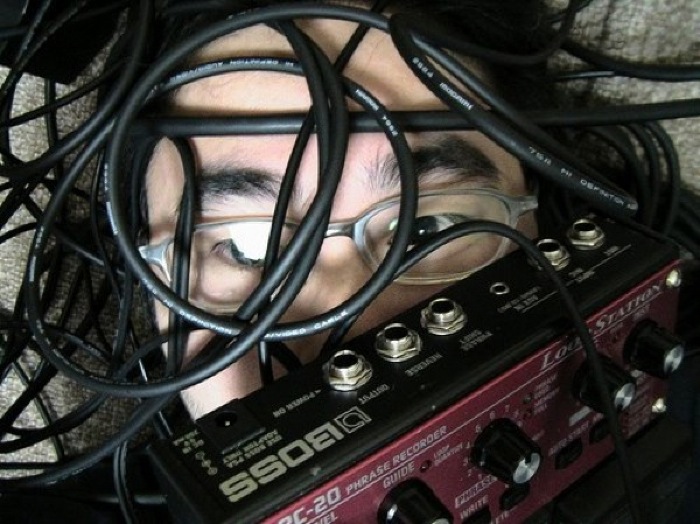You’ve all done it, so stop pretending.
Your favourite metal tune starts playing. You make a rock-face. You bend your knees, crook your elbows, tighten the fingers of either hand into a claw-like rictus and start flailing away at the invisible strings of your favourite make of imaginary axe.
If you’re particularly ardent about it, you may even do that rapidfire bobblehead neck-snap thing that, to be perfectly honest, makes you look like the Chicken Lady regardless of whether you’re imitating a traditional longhaired Pantene-Pro-using metal guitarist or one of the 90s-flavoured baldhead-plus-neck-tattoo-and-excessively-pointy-bearded ones. And then, inevitably, from somewhere deep in your throat, the horrible noises begin to emerge: “BWAOOOOOOOM … widdlawiddlawiddlawiddlawiddlawiddla.”
Take note, hipsters: at such a moment, all irony collapses into the thing itself. Whether you really meant it or not, the cold hard truth is that you still did it and will, in all likelihood, do it again, given the opportunity. I used to work in a record store. I’ve seen you. You probably even came up to me at some point and said, “Dude, I totally don’t know the name of the song, but it kind of goes like this: “BWAOOOOOOOM … widdlawiddlawiddlawiddlawiddlawiddla. Can you help me?”
As a matter of fact, yes. Yes, I can help you. Read carefully, for this is the most helpful thing you will learn all day: Dokaka is the Michael Jordan of air guitar, a veritable god, soaring above your puny bobbling head like a great metal condor.
Dokaka became great because of the lameness of others. Others like you. Once, Dokaka had a band. His band members were lame. As each lame band member dropped out of rehearsal in turn, Dokaka began to use his voice to replace the sound of their instruments. Soon, there was only Dokaka. Dokaka, and his greatness.
Using your voice to imitate the sound of a machine is as old as the twentieth century. Even during the heights of the modernist avant-garde, the sound poetry of the Italian Futurists failed to impress Ezra Pound (and, as a fellow Fascist aesthete, he was inclined to be sympathetic). In an essay on the work of his friend George Antheil, Pound ranted as follows:
I am perfectly aware that you can imitate the sound of machinery verbally, you can make new words, you can write ‘pan-pam vlum vlum vlan-ban etc., […] but these are insufficient equipment for the complete man of letters, or even for national minstrelsy. The mechanical man of futurist fiction is false pastoral, he can no more fulfill literature than could the bucolic man.
For Pound, music is nevertheless “the art most fit to express the fine quality of machines,” and “there would be something weak about art if it couldn’t deal with this new content.” Pound was dead wrong about many things, which is why his scrawny, anti-semitic ass eventually was tossed into a tiger cage (sans tigers) in Pisa. But Pound had this much right: the trick would be to complement the human with the mechanical without “humanising” the mechanical by translating it back into words. In the entire history of twentieth-century sound poetry, this happened all too rarely. And, when it did happen, it almost never (maybe ever) rocked like a motherfucker.
Dokaka succeeds where entire generations of barking hippies have failed because he instrumentalizes his voice and structures the results with the aid of the very technology he emulates. Dokaka lays down his vocal analogs for each “instrument” track by track, then layers them together. The result is an amalgam of poetic metal righteousness: human becoming machine, machine becoming human. If the Four Horsemen (the mightiest of twentieth-century sound poetry ensembles) and the Four Horsemen (the ultimately doomed biker-rock supergroup produced by Rick Rubin) banded together to record Metallica’s “Four Horsemen,” it might sound like Dokaka.
Might. Because Dokaka is producing vocal analogues for sounds that, strictly speaking, did not even exist until the late 1980s. Listen to the cover of Slayer’s “Angel of Death” on his website – perhaps Dokaka’s finest moment to date, work on Björk’s Medulla included. Slayer is, by almost all accounts that matter, the heaviest heavy thing ever. When Dokaka does that screaming glissando just before the “vocals” would normally start, if everything he doesn’t wasn’t all vocals anyway, that is the first time a human has ever made that noise.
… outside of the voices of those of you that used to come up to me in the record store and begin “Dude, I totally don’t know the name of the song, but it kind of goes like this,” that is. And, compared to Dokaka, you suck. Which makes Dokaka, by extension, the heaviest sound poet/air guitarist/slightly drunken otaku guy ever (that he may be the only sound poet/air guitarist/slightly drunken otaku guy in history is irrelevant to the crushing power of the logic of this argument).
So then: your path is clear. Study Dokaka. Learn from him. Emulate his moves. His kung-fu style is strong. And, slowly, because of your efforts to improve your own sorry-ass technique, the world will become slightly less lame.
Originally published as “Alienated 8: Dokaka – Air Guitar Jordan.” Matrix 78 (fall 2007): 46-47.

